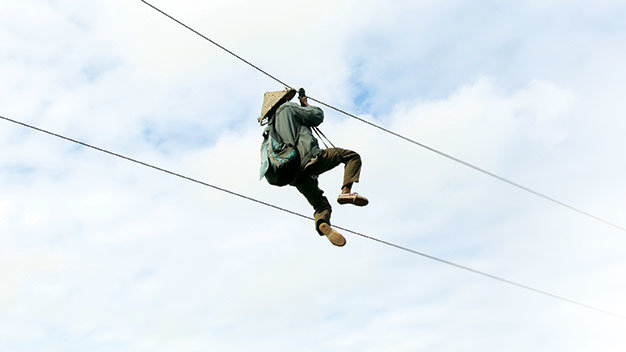Local people in Krong Bong District in the Central Highlands province of Dak Lak risk their lives daily by using a homemade cable pulley system to cross a river because they cannot find any other means of transport.
Accidents happened when locals travelled across the Krong Ana River by using such homemade cable pulley system, with several deaths.
The latest case is Nguyen Chua, 51, who died after he fell from the suspended cable on October 26.
When Chua, who lived in Ho Le Commune of Krong Bong District, was about to reach the other river bank to his coffee garden, the cable suddenly broke, dropping him down 10 meters.
He was seriously injured by stones and underwater stakes and locals took him ashore, but he died before he could be taken to hospital.
On August 25, 2014, Nguyen Thi Tho, Chua’s wife, also fell from the cable and suffered severe injuries to her neck, jaw and other parts.
As there is no bridge across the river, local residents have built about 20 such homemade systems in Hoa Le commune, said the commune authorities.
Locals use the system to access the roughly 300 hectares of crops growing on the other side, the local government said.
The zipline gear, including a pulley made from iron wheel of sliding door, an iron hook and a rope, is worth some VND40,000 ($2) in total.
Almost all the people living close to the river has one set so that they can cross the river at any time.
Tuoi Tre’s reporter returned to the location of the accident causing Chua’s death and found the people in this area continuing to use such a system.
“How can we cross the river without using such a system? Though crossing the river that way is dangerous, but without crossing the river to do the farm work, we will be starving to death,” said Nguyen Thu, 68, who has been crossing the Krong Ana River by using the system for over a decade.
Though living on one side of the river, almost all their farmland, hundreds of acres of arable land, are on the opposite side.
The dream of locals there is a permanent suspension bridge.

Rescuing a woman trapped when using homemade cable pulley system. Accidents like this can sometimes happen.

When an error happen to the cable system, restricting the man from reaching one end of the system, he has to use his own hands to pull himself little by little.

Despite knowing that traveling across the river in such a way is dangerous, every day there are several hundred villagers using the ‘zipline’ to cross the river for cultivation purposes. Not only for humans, the system is also to transport bags of coffee, corn, banana, and grass for cattle.

Approximately at 7:00 am daily, people will gather at one end of the system to prepare to cross the river.

A local woman told Tuoi Tre she crosses the river by using the system every day, but almost every time she is preparing to move, she has to hold her breath for courage.

A bag of coffee is stuck when being transported via the system; the owner has to come out to reach it and pull it with his own hands.
Like us on Facebook or follow us on Twitter to get the latest news about Vietnam!





















































